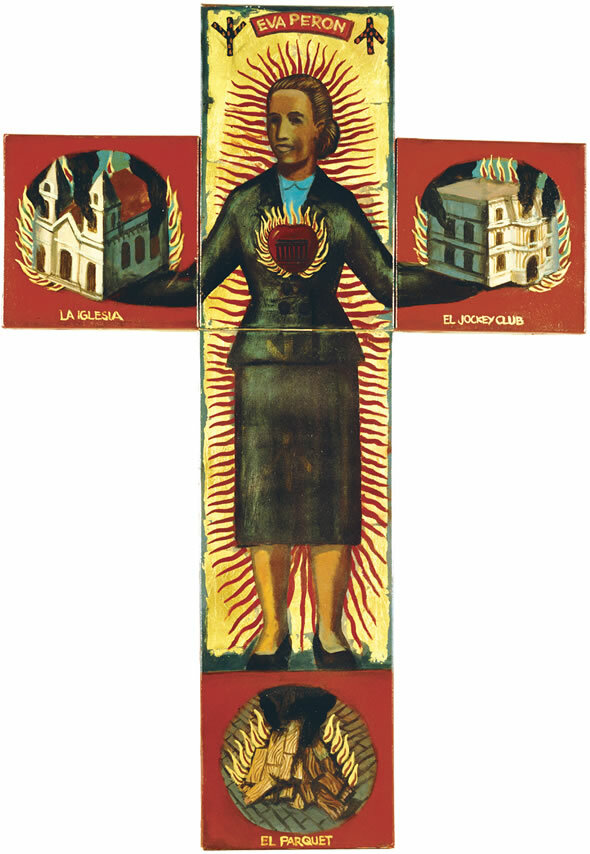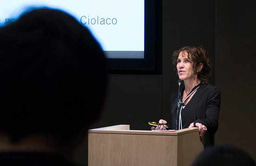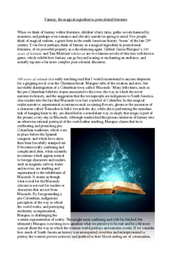Politicizing Motherhood: The Dark Underside of Maternal Reverence in Latin America

Mothers have long held a privileged place in society, figured as endlessly benevolent and associated to a sense of unity and belonging. Phrases such as ‘mother earth, motherland, mothership’ attest to this notion of motherhood being intrinsically linked to a primitive state of wholeness and reveal the extent to which mothers have historically been put on a pedestal by western culture. It is interesting then, that despite this age-old romanticization of the mother figure, so many representations of modern motherhood predicate upon fragmentation. The huge success of television series desperate housewives is perhaps the best example, its popularity snowballing into various reality TV spinoffs that worked their way through America before coming to the UK. The desperate housewives of fictional wisteria lane quickly turned into the real housewives of Shropshire, a testament to the never-ending entertainment value of messy, contemporary motherhood and wifehood.
The messaging of desperate housewives is murky, its attempt to break down patriarchal narratives around modern motherhood, half-hearted, but one thing is clear, if motherhood has been fragmented by modernity, then it makes for good tv. It was this observation that led me down a path of inquiry into the double-edged representation of mothers. Critics and journalists I admire seemed to agree… A pandora sykes essay I read began, ‘if there is a woman who hasn’t been fragmented by motherhood I am yet to meet her’. Critically acclaimed academic and journalist Jacqueline Rose wrote a novel-lengthed essay, arguing that, ‘unless we recognise what role we are asking mothers to perform in the world, and for the world, we will continue to tear both the world and mothers to pieces.’ But all this debate around splintered motherhoods was coming from the west, where modern development is at its most advanced. This got me thinking, if western culture, or capitalism has somehow splintered motherhood to the point that its messiness is now a nation-wide form of comic relief, then how has this translated over to a place where western modernity, as we know it, is itself a site of fracture? How does the western representation of motherhood, already breaking off into pieces in its homeland, sit within a context that has already been fragmented so irreversibly by the cultural agenda of imperialism?
Latin America is such a place, still so intensely haunted by the legacy of imperialism that the very notions of primitive wholeness, belonging and unity that motherhood is traditionally associated to are necessarily complicated. Indeed, la Malinche, the mother figure of Mexico, thought to have birthed the first ‘mestizo’, that is the first half american-Indian, half Spanish child, is a figure so stooped in betrayal she has been coined the ‘mexican eve’. She can only be the mother of the mestizo people if she forsakes her heritage and mixes her indigenous blood with that of the enemy, the conquistador. Her identity as the mother of Mexico is therefore predicated upon this paradox, the idolized mother is only an emblem of unity as much as she is a reminder of separation from her origins. Motherhood always requires sacrifice, be it the physical surrender of a woman’s body to house that of another, or the emotional sacrifice, not to mention the financial and temporal sacrifices needed to bring up said child. And what is la malinche’s betrayal if not a sacrifice of sorts? A sacrifice of her native people, land, identity, to birth a new place of mixture and hybridity, Mexico.
I bring up La Malinche because she is a crucial figure in understanding the complex forces at play in any theorization of fragmented motherhood and Latin American national identity. The very act of being a mother marks her as a Judas, and it is this cult status of both mother and betrayer that captures the double-edged representation of motherhood so strongly felt in a place as colonially charged as Latin America. As Elsa Chaney has discovered in her research into the political involvement of women in south America, mothers hold a uniquely paradoxical position, idolized as the matriarchs of an intensely patriarchal society that seems intent upon suppressing and stifling them as much as it is hell bent on idolizing and venerating them. To this day, Argentina remains an intensely matriarchal society, although the prevalence of ‘machismo’ and high femicide rates continue. Perhaps then, La Malinche is revered by her people as much as she is resented. The need to be recognised as a new and separate people comes hand in hand with the pain of being new, neither one or the other, a hybrid torn between two spaces, never quite fully either. It therefore follows that the Latin American relationship to motherhood is two-fold. The craving for a mother figure cannot be separated from a resentment towards her.
The language associated to motherhood is political, and has been used throughout history to advance specific, usually conservative, political agendas. Cynthia A. Stravynos, a leading political scientist, traces the history of what she calls the ‘politicization of maternal rhetoric’ throughout America, explaining that by the late 1700s, americans began to attribute moral superiority to the role of the mother figure. Despite the historical oppression of women, this cultural assumption of their moral superiority vis-à-vis child rearing and domestic life became a powerful weapon that women capitalized on in their fight for power. There is no doubt that this narrative about mothers as moral guardians is rooted in patriarchal values that imagine women to be extremely sensitive, emotional and born with an endless capacity for self-sacrifice. However, what is striking is how women used this nevertheless restrictive ‘benevolent mother’ stereotype to open doors rather than close them. The little superiority over men that this afforded them was leveraged by women worldwide to advocate for their independence, the female vote being the most obvious example. By analysing the tactful change in rhetoric that women promoting the suffragete movement in America made at the turn of the 20th century (which is not coincidentally when suffragettes began having success), from demanding the vote on the grounds that women are equal to men, to the reasoning that women could use their ‘motherly natures to improve society’, historians such as Kraditor have convincingly demonstrated just how much power maternal rhetoric carries. Whilst the struggle to secure the female vote was a progressive and anti-traditional initiative at the time, it is crucial to remember that it was the palatable language of ‘republican motherhood’ as Stavrianos puts it, that actually mobilized the movement.
The political currency of motherhood becomes intensified in Latin America, which is more catholic and therefore more conservative than its northern counterpart. Through her research, historian Elsa Chaney has discovered that contemporary female politicians in Peru and Ecuador speak of their public persona and political involvements as extensions of their domestic life. Beyond mothering their children, they are mothering their nation too. Historian Linda Kerber has given this use of maternal rhetoric a name, the performance of ‘republican motherhood’, but crucially, she situates it in the context of a newly formed America. This speaks to the political currency that motherhood holds, a value that only increases as it crosses the border over to the far more catholic, patriarchal and conservative south. Remember; motherhood acquires greater political significance when countries are beginning to develop an individual sense of national identity, It is with this awareness of the heightened political currency of maternal rhetoric in mind that I turn to the peculiar case of Evita Perón.
Evita Perón is a unique phenomenon. Her status as the female icon of Argentina has been acknowledged worldwide (for proof you need only recall the familiar hum of ‘don’t cry for me Argentina’ from the Alan Parker musical-meets-bio pic featuring Madonna.) The colossal weight of her legacy can still be felt today throughout the streets of Buenos Aires, in the Recoleta museum, for example, where her body lies or the Evita museum, or the way in which an Argentine family will mention her name, full of pride and longing, at the dinner table. But above all, the endless plethora of cultural production that she has inspired, ranging from poetry to theatre and even children’s books, is testament to her remarkable, undying popularity. When I first visited Buenos Aires in 2017, I struggled to see the appeal. She seemed so average to me. Blonde and pretty, sure, but not endowed with the type of strikingness I was used to attributing to female icons. I also found the intensity with which Argentines loved her bizarre, how had this average looking, not particularly talented actress managed to leave such a widespread adoration behind that it almost pretty much overshadowed her husband’s presidency? Why does the Argentine population continue to worship her like a goddess to this day? And above all, what can her status as ‘mother’ of the nation tell us about the political currency of motherhood, and its subversiveness?
It is not often that an ‘average’ woman makes history, but in the case of Evita Perón it is exactly this, her accessibility and lower-class roots that fuelled the fire of her fame. Born as the illegitimate child of upper class estanciero Juan Duarte and a local woman from the rural town of Los Toldos, where Duarte worked as estate manager, Eva Perón came from humble beginnings, and it was her self-motivated decision, at the ripe age of 15 to move to Buenos Aires and pursue an acting career that led to her fame. In Alan Parker’s 1995 musical, evita’s acting trajectory, from the small parts she first began with, to her pivotal debut as a radio actress and even her (abysmal), short-lived parts on-set, is played alongside a slideshow of the tumultuous political events that took place in Argentina during the early 1940s, such as ‘governments falling like flies.’ This combination of scenes reveals a message that lurks beneath the surface of the entire film; that Evita’s political role is just another performance in her acting career.
When Perón gets elected and Evita becomes the first lady, she tells him, ‘let’s get this show on the road!’ What follows is a theatrical makeover scene, sound-tracked to ‘Rainbow High’ in which Evita demands her dressers to, ‘Christian Dior me… I’m the product, its vital you sell me, so machiavell me, make an Argentine rose’. Whilst the musical overemphasizes the process of glamorization that Evita orchestrated– it is after all a Hollywood musical, and what are musicals if not performances of exaggerated theatricality, musicality, glitz and glamour?- it does indeed pick up on a truth that all the academics agree on too, that Evita is an extremely skilled performer, whose public persona is the product of careful self-fashioning. Despite the connotations of wealth and ostentation that her imperative, ‘christian dior’ me suggests, Evita is in fact aiming for the image of an ‘argentine rose’, rose functioning as an emblem of feminine beauty, but an organic, natural one that grows from the roots of the argentine nation, and is in keeping with her humble origins.
The Latin American scholar, Sarah Mesimer, argues that through her speeches, appearance, political campaigns and charity work with the foundation she set up, to support the orphans of Buenos Aires, Eva Perón successfully remade herself into ‘evita’, the mother of the argentine nation. Through her emphasis on simplicity, humility and femininity, Eva was able to carve out a position for herself alongside Perón that would offer her power without threatening his role authority, as president in what was and continues to be a patriarchal society. Although critics acknowledge that her performance is still located within a ‘binary system based on gendered divisions’ (Diana Taylor, disappearing acts), they also applaud her ability ‘to use this system to her advantage and remake it to suit her own purposes.’ (108).
It is for us to decide whether Evita Perón’s overt self-packaging as ‘mother of the nation’ was a subversive, feminist act of empowerment, or yet another political move that reinforces patriarchal expectations. What this fascinating case does make clear is the never-ending longing for a national mother, and her incomparable appeal. Motherhood may be fragmented and splintered, but it is still a fundamental, irrepressible, global longing.



Please sign in
If you are a registered user on Laidlaw Scholars Network, please sign in